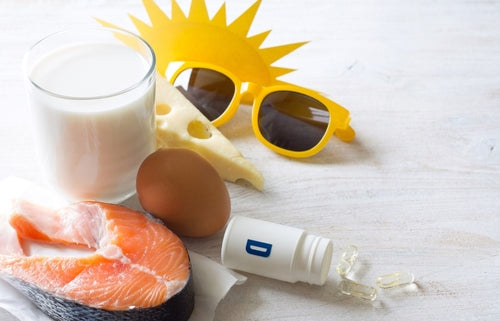
The Surprising Role of Vitamin D in Joint Health
Share
If you're an active adult, you’ve likely invested in the best shoes for your workouts, tried targeted exercises to strengthen your joints, and maybe even explored supplements for joint health. But one nutrient that might not be on your radar is Vitamin D. Often associated with bone health and immune support, this sunshine vitamin plays a pivotal role in joint and muscle function, especially for those who love to stay active.
What Does Vitamin D Do for Joints?

Vitamin D is essential for calcium absorption, which directly impacts bone density and strength. But its benefits go beyond bones:
Cartilage Protection: Research suggests that Vitamin D helps maintain cartilage, the smooth tissue that cushions your joints. Low levels of Vitamin D have been linked to conditions like osteoarthritis.
Inflammation Reduction: Vitamin D’s anti-inflammatory properties can help ease joint discomfort by reducing swelling and stiffness, making it particularly beneficial for active adults who might overuse their joints.
Muscle Support: Strong muscles are crucial for joint stability. Vitamin D supports muscle function, helping to prevent injuries that could sideline you from your favorite activities.How Active Adults Benefit

For those who run, lift weights, hike, or engage in high-impact sports, joints take on a lot of stress. Vitamin D can help:
Enhance Recovery: By supporting muscle and joint repair, Vitamin D speeds up recovery times after workouts.
Prevent Injuries: With stronger muscles and better joint support, you’re less likely to experience sprains, strains, or wear-and-tear injuries.
Improve Performance: Healthy joints and muscles mean better range of motion, endurance, and overall performance.Are You Getting Enough Vitamin D?

Vitamin D deficiencies are surprisingly common, even among active adults. Signs of low Vitamin D include:
Persistent joint or muscle pain
Fatigue
Frequent injuries or slow recovery
Mood swings or low energyYou can get Vitamin D from sun exposure, food, and supplements. Foods like salmon, fortified cereals, and eggs are great sources, but supplementation may be necessary if you live in areas with limited sunlight or spend a lot of time indoors.
How to Incorporate Vitamin D into Your Routine

Here are some tips to ensure your joints and muscles get the Vitamin D support they need:
Enjoy the Sunshine: Aim for 10-30 minutes of midday sun exposure a few times a week, depending on your skin tone and location.
Check Your Diet: Add Vitamin D-rich foods to your meals, like fatty fish, mushrooms, and fortified milk.
Consider Supplements: A daily supplement can help fill in the gaps. Look for Vitamin D3, the most effective form for boosting levels.
Consult a Healthcare Provider: If you suspect a deficiency, a simple blood test can confirm it. Your doctor can recommend the right dosage for you.
Final Thoughts
Vitamin D might not be the first thing that comes to mind when you think about joint health, but it’s a game-changer for active adults. By supporting cartilage, reducing inflammation, and strengthening muscles, this powerhouse nutrient keeps your joints functioning at their best so you can keep moving, pain-free and strong. So, next time you’re planning your fitness routine or diet, make sure Vitamin D is part of the equation. Your joints will thank you.
